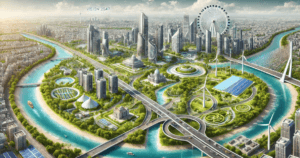Bill Gates: India’s 2047 Vision Could Change the World – Here’s How
Bill Gates believes India’s 2047 development plan will positively impact both the country and the world. Speaking at the Express Adda event, he praised India’s rapid innovation and democratic governance, highlighting its steady economic growth, which is expected to remain between 5% and 10%, allowing greater investment in healthcare and education. He views AI as a transformative force but does not believe it will eliminate jobs, though he expressed concerns over its rapid development. On climate change, Gates acknowledged that the world may miss the 1.5–2°C target but remained optimistic about technological solutions.
He also highlighted India’s achievements in digital public infrastructure, such as Aadhaar and UPI, and noted the country’s increasing role in AI. However, he advised against subsidizing chip manufacturing unless India becomes competitive in the sector. Gates emphasized the need for India to focus on applying AI effectively, particularly in developing models for native languages. Additionally, he voiced concerns about the decline of investigative journalism, particularly in the U.S., and hoped philanthropic organizations would step in to support the industry. This visit marked his third trip to India in three years as his foundation continues its efforts in healthcare and innovation.

Bill Gates: India’s 2047 Vision Could Change the World – Here’s How
Microsoft co-founder and renowned philanthropist Bill Gates recently expressed his optimism about India’s goal of becoming a developed nation by 2047. Speaking at an event in Mumbai, Gates emphasized that India’s progress will not only benefit its own citizens but also have a positive global impact. He highlighted the country’s combination of rapid innovation and strong democratic institutions as key drivers of this growth.
Gates pointed out that India’s economy is projected to grow steadily between 5% and 10% annually. This economic expansion, he explained, will allow for greater investments in crucial sectors such as healthcare and education. Improved access to these services could lift millions out of poverty and serve as a model for other nations facing similar challenges.
AI’s Role: Opportunities Over Job Loss Fears
Discussing artificial intelligence (AI), Gates acknowledged its potential to transform daily life but dismissed concerns about widespread job losses. He argued that jobs exist because societies experience shortages—whether in goods, services, or skills—and AI could help bridge these gaps by enhancing efficiency. For instance, AI-driven innovations could improve agricultural practices to mitigate food shortages or streamline healthcare delivery to underserved communities.
However, Gates admitted that the rapid pace of AI advancements makes him uneasy. “I wish progress were slower,” he stated, emphasizing the need for thoughtful planning to address risks such as misinformation and misuse of the technology.
Climate Change: Realism Meets Hope
On climate change, Gates was candid about the challenges ahead. He noted that limiting global warming to 1.5°C or even 2°C—a goal many countries strive for—is becoming increasingly difficult. Rising temperatures are already triggering extreme weather patterns, and cutting emissions quickly enough remains a major hurdle. Despite this, he remains hopeful. Advances in clean energy, such as more affordable solar power and improved battery storage, could help humanity adapt and prevent the worst consequences. Gates also praised India’s efforts in renewable energy, particularly its push for large-scale solar farms, as a sign of meaningful progress.
India’s Digital Leap: A Model for the World
Gates repeatedly applauded India’s advancements in digital infrastructure, particularly Aadhaar (a biometric ID system) and UPI (an instant payment platform). These innovations, he said, have transformed access to essential services such as banking and welfare distribution for millions of people. During his visits, he has observed a growing number of startups and businesses leveraging these systems, demonstrating that India’s technological progress is advancing faster than many had predicted.
He encouraged India to continue focusing on practical AI applications, such as improving education and healthcare, rather than investing in semiconductor manufacturing unless it can compete globally. “India’s strength lies in scaling solutions,” he remarked, suggesting that the country could play a leading role in making AI tools affordable and widely accessible.
Concerns About Journalism’s Decline
Beyond technology, Gates expressed concern about the decline of investigative journalism, particularly in the U.S., where many local newspapers have shut down. He described this trend as “dangerous” for democracy, emphasizing that quality journalism is essential for holding leaders accountable and keeping the public informed. He hopes that philanthropic organizations will step in to support struggling media outlets.
Gates’ Ties to India
This visit marked Gates’ third trip to India in three years. His foundation, the Bill & Melinda Gates Foundation, collaborates with Indian organizations on various health initiatives, including vaccine development and maternal healthcare. He praised India’s ability to produce cost-effective, high-impact solutions—such as affordable vaccines—that benefit other developing nations.
Final Thoughts
In summary, Gates views India as a rising global leader whose success could serve as an inspiration for other countries. By leveraging innovation, investing in its people, and sharing solutions such as digital infrastructure, India’s journey to 2047 could help create a healthier and more equitable world. While challenges such as climate change and AI ethics remain, Gates believes that collaboration and smart policies can turn these obstacles into opportunities.
You must be logged in to post a comment.